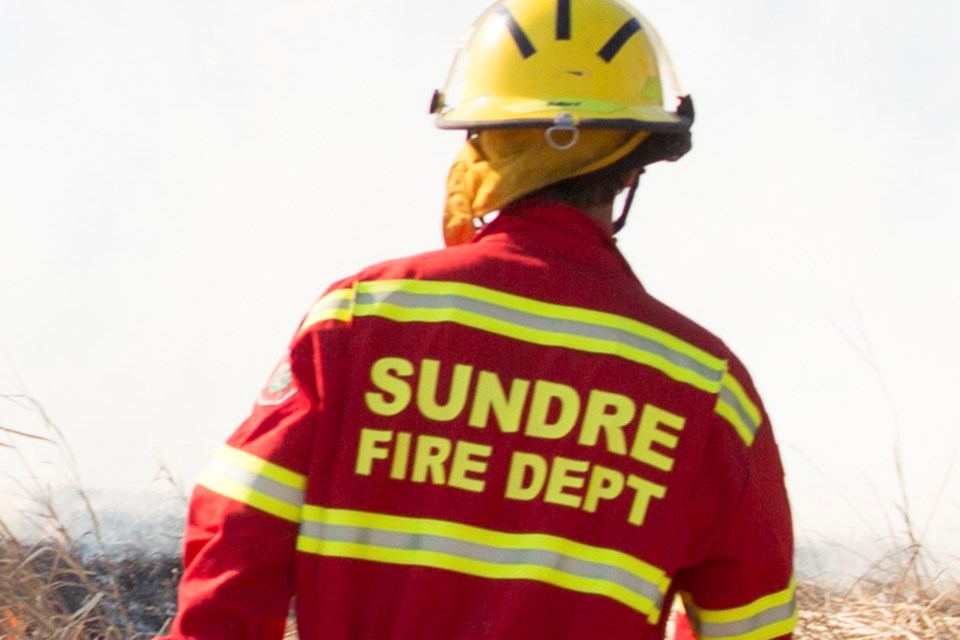SUNDRE – The local fire chief is confident with his department’s level of preparedness as Alberta braces for dry conditions brought on by extreme droughts this summer, prompting concerns about a potential repeat of last year’s devastating wildfire season.
“Everyone’s speculating it’s going to be higher,” Sundre Fire Department Chief Ross Clews said in response to being asked about his thoughts regarding this year’s potential risk for grass and wildfires.
“The moisture hasn’t been present; it’s a drier year. So there are concerns,” Clews told the Albertan earlier in March.
“We’re prepared for what we need to do,” he said.
Alberta’s wildfire season was once officially declared at the start of April, but the decision was made in 2016 to extend it by starting on March 1. Due to the disconcerting conditions this year, the provincial government declared the start of the province’s wildfire season on Feb. 20.
The Alberta Fire Chiefs Association (AFCA) had prior to that declaration expressed concerns about what the organization considered to be a lack of adequately funded preparedness planning as well as communication from the provincial government toward coordinating a comprehensive, province-wide response strategy.
Although the association has since said it was encouraged by the government’s announcement to start the wildfire season earlier as well as the possibility of additional wildland firefighters, concerns remain with regards to “the absence of specific financial commitments” that raise “concerns about the adequacy of funding for these essential wildfire preparedness and response initiatives,” reads part of an AFCA statement.
“While we understand the budgetary process’s constraints, transparent and timely communication regarding funding allocations will be crucial for strategic planning and effective implementation of these measures.”
Further, while the association said the province’s intention to have 900 wildfire firefighters ready for deployment by April 15 “is a step in the right direction,” it expressed concerns about the timing.
“We are apprehensive that this may not suffice or be soon enough. In the event of a major fire threatening a community outside of the forested protected area, it leaves it up to the municipalities to solely seek out and carry the financial burden of additional contractors or pulling resources from neighbouring municipalities, which jeopardizes the assisting community’s ability to be ready for their own emergency events.”
Asked for his thoughts on the provincial government’s efforts to prepare for the wildfire season, Clews expressed support for “all activities for wildfire fighting provincially. They’re still putting plans in place, so there’s nothing finalized yet.”
From a local perspective, Clews sounded confident with regards to where the Sundre department stands.
“I’m quite happy with our preparedness for the fire season right now at this time,” he said.
Not to be confused with controlled burns, which the department does not make a habit of conducting, Clews said the kind of exercises that have previously been held at Snake Hill involving efforts to burn portions of grass are wildland urban interface training courses that bring together the town’s firefighters to work alongside their counterparts with provincial forestry teams to improve coordinated responses.
As to whether the Sundre department might be prepared to redeploy any of its members elsewhere in Alberta should the need arise, the chief said, “Well, we look after our own first. If our conditions are high, we won’t be deploying people.”
However that being said, if the situation allows, the Sundre department would in tandem with area regional fire halls muster up a task force of members who want to respond so that the onus does not fall upon a single community’s crew, he said.
“And that’s strictly voluntary deployment,” he added.
A sizeable wildfire scenario training exercise that will feature a mock evacuation is expected to take place later this month in Cochrane with the participation of nearly 200 Search and Rescue members from 22 teams across Alberta including a contingent from Sundre as well as that municipality’s personnel in partnership with the RCMP, AHS and the province.
Throughout the 2023 season, nearly 1,100 wildfires burned a record 2.2-million hectares, or 10 times more area than the five-year average.



